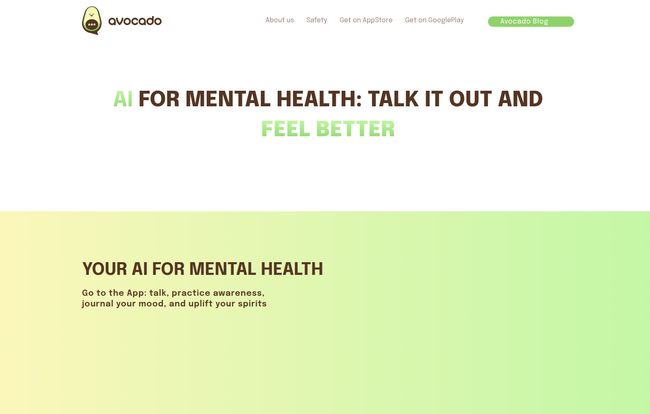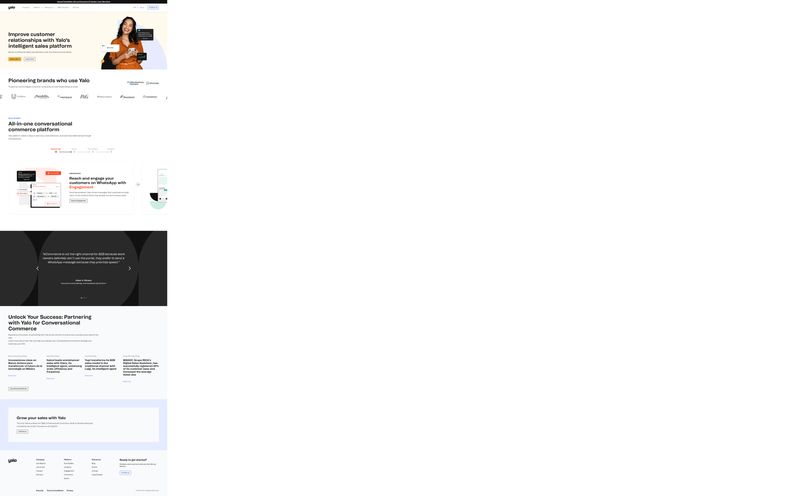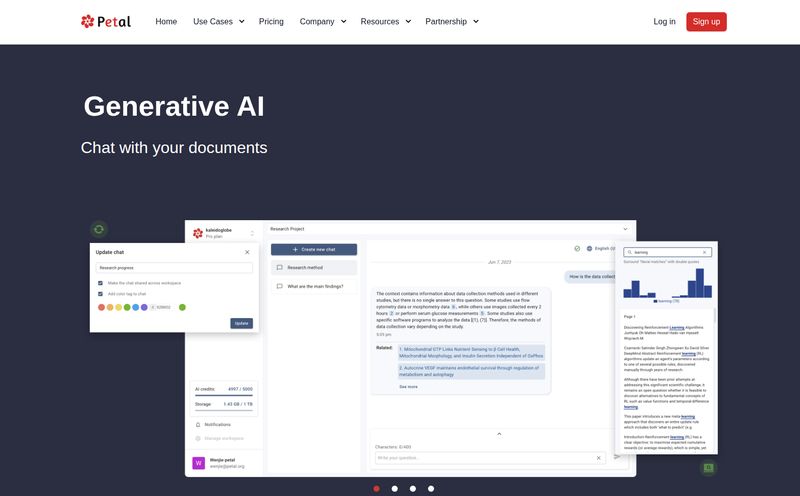We're all a bit frazzled. The world keeps spinning faster, the to-do lists are monsters, and sometimes your brain feels like a web browser with way, way too many tabs open. I've been in the digital marketing and SEO world for years, and I've seen the word 'burnout' go from a buzzword to just... a regular Tuesday. We’re all looking for ways to cope, to find a little bit of quiet in the noise.
Traditionally, that meant booking a therapist, which is amazing, but also comes with its own hurdles: cost, scheduling, and the big one—actually getting yourself to go. So, when new tools pop up promising support, my ears perk up. The latest one to cross my desk is an app called Avocado. And no, it's not another recipe app. Its tagline is “AI for mental health,” offering a companion right in your pocket.
Now, I know what you’re thinking. An AI? For my feelings? I was skeptical too. The idea of pouring your heart out to a piece of code can feel a little bit… weird at first, like talking to a very, very smart toaster. But I’ve learned to never dismiss a new tech trend out of hand. So, I dug in.
So, What Exactly Is This Avocado Thing?
At its core, Avocado is positioned as an AI companion designed to offer 24/7 personalized mental health support. Think of it as a mental wellness first-aid kit in your pocket. The whole idea is to give you a safe, confidential space to talk through whatever's on your mind—stress from work, anxiety about the future, the complexities of friendships, you name it. It's especially geared towards young people, who are navigating some of the most turbulent waters of life.
It’s not just a chatbot you vent to. It’s designed to be adaptive, learning from your conversations to provide more personalized support over time. The goal is to help you build resilience, find a little inner peace, and practice self-care in a way that feels modern and, most importantly, accessible.
The Big Question: Can an AI Actually Help Your Headspace?
This is the million-dollar question, isn't it? The debate around AI in mental healthcare is a hot one. Some people in the field, like Dr. Elissa Epel at UCSF, have pointed out the potential for these tools to deliver evidence-based interventions on a massive scale. Others worry it’s a step toward removing the essential human element from care. My take? It’s not a simple yes or no.
The Upside of an AI Confidant
I have to admit, the advantages are pretty compelling. Imagine it’s 3 AM. You’re wide awake, anxiety is buzzing like a trapped fly in your skull. Who can you talk to? Your friends are asleep. A therapist appointment is a week away. But your phone… your phone is right there. That 24/7 accessibility is a game-changer for in-the-moment support. There's no judgment. You don’t have to worry about burdening someone or saying the “right” thing. You can just let it all out, raw and unfiltered. For many, that anonymity is incredibly freeing.
And let’s not forget the cost. While not a replacement for therapy, an app is almost certainly more cost-effective than weekly sessions. It breaks down a huge barrier to entry for people who need some support but can’t afford the traditional route.
Where Human Touch Still Wins
Let's not get it twisted. Avocado, or any AI for that matter, is not a replacement for a licensed human therapist, especially for severe mental health conditions. An AI can’t read body language, catch the subtle tremor in your voice, or offer the kind of deep, empathetic connection that comes from shared human experience. It’s a support, not a cure. The app’s effectiveness also hinges entirely on your engagement. If you give it one-word answers, you're not going to get much back. You have to be willing to open up to the algorithm, which is a leap of faith in itself.
A Look Inside the App's Toolkit
Okay, so beyond just chatting, what does Avocado actually do? This is where it moves from being a simple chatbot to a genuine wellness tool. According to their site, it's packed with practical features to help you actively manage your mental state.
You get things like mindfulness exercises for when you're feeling overwhelmed and stress management techniques you can use on your lunch break. There are also sleep enhancement tips (yes, please), guided journaling prompts to help you untangle your thoughts, and a mood tracker. That mood tracker is a surprisingly powerful feature. Seeing your emotional patterns laid out over time can reveal triggers and trends you never would have noticed otherwise. It’s all about building a toolbox for a healthier mind.

Visit Avocado - AI for Mental Health
The All-Important Privacy Question
Talking about your deepest fears and anxieties with an app naturally brings up a huge red flag: privacy. Where is all this data going? This is probably the biggest hurdle for any digital mental health service. Avocado's website claims they offer a safe and confidential space with strong security measures. I'd still advise anyone to read the privacy policy with a fine-tooth comb before diving in—that's just good practice for any app, especially one that handles such sensitive information. Trust is everything here, and it’s on them to earn it.
What's the Cost of Peace of Mind?
So, what will this set you back? Here’s where things get a bit funny. I went looking for the pricing details and… hit a 404 page. The classic 'oops, nothing here!' screen. For a startup, its a relatable hiccup. For a potential user, it means the cost is currently a mystery. Is it free? A freemium model with a premium subscription? A one-time purchase? Your guess is as good as mine right now. I hope they get that sorted soon, because transparency in pricing is a big deal for building user trust.
Frequently Asked Questions
Is Avocado a replacement for a therapist?
No, definitely not. It's best viewed as a supplementary tool for support, self-care, and managing day-to-day stress. For serious mental health conditions or crises, you should always seek help from a qualified human professional.
How does Avocado personalize support?
The AI is designed to be adaptive. It learns from your conversations, moods, and the challenges you mention to offer more relevant advice, prompts, and exercises over time.
Is my data safe with the Avocado app?
The company claims to have strong security and privacy measures in place to ensure a confidential experience. However, it's always wise for users to review the privacy policy themselves before sharing personal information.
Can I use Avocado anytime?
Yes. One of its main benefits is 24/7 accessibility. You can chat with the AI companion whenever you need support, day or night.
What kind of self-care tools does it offer?
It includes a range of practical tools like mindfulness exercises, stress management techniques, tips for better sleep, guided journaling prompts, and a mood tracker to help you understand your emotional patterns.
Is the Avocado app free?
The pricing information isn't currently available on their website. It could be free, have a subscription model, or use a freemium structure. We'll have to wait for more information on this.
My Final Thoughts on Avocado AI
So, where do I land on Avocado? Cautiously optimistic. I love the mission. Making mental health support more accessible is a noble and necessary goal. The convenience and lack of judgment an AI offers could genuinely help a lot of people who are currently suffering in silence.
It’s not the deep-sea submarine dive of intensive psychotherapy; it's more like a friendly snorkel in the calmer waters of self-awareness. And sometimes, that's exactly what you need. It's a tool, and like any tool, its value lies in how you use it. If you're looking for a low-pressure way to check in with yourself and build some healthy mental habits, Avocado seems like a really interesting option to keep an eye on. It might just be the friendly, non-judgmental avocado you need in your life.
Reference and Sources
- Avocado Official Website: www.youravocado.app
- UCSF Department of Psychiatry and Behavioral Sciences: Can AI Chatbots Help Solve Our Mental Health Crisis?



